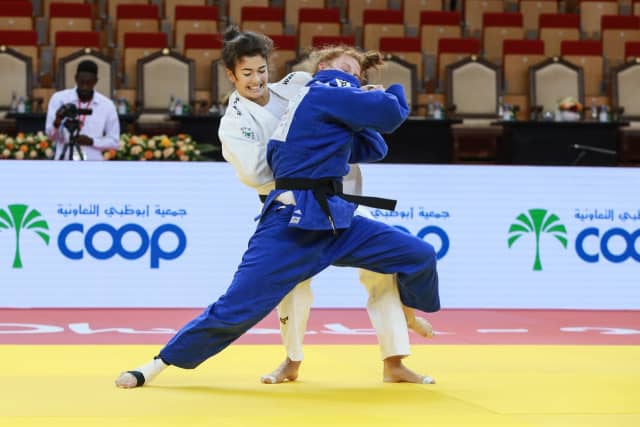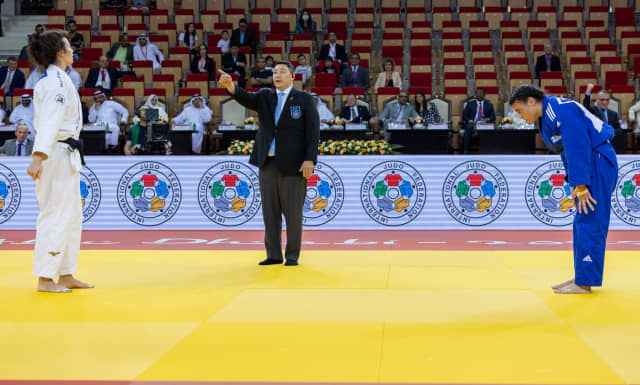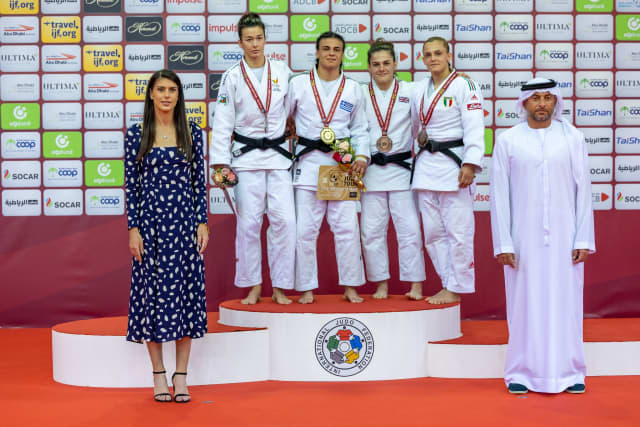On the one hand, she has to train again to return to the circuit with guarantees. On the other hand, she has to take care of her family, even during the tournament. Abu Dhabi was her second event since the European one in Bulgaria and it shows that she is looking for sensations and certainties to recover her level. In other circumstances Polling would have pulverised the Greek Elisavet Teltsidou, but it is the law of life, the Greek has trained while the Dutch is changing nappies. That is the harsh reality of women, which gives them even more credit, and seeing Polling is a reward for their sacrifice based on the freedom to choose. As for Teltsidou, there is no reproach to be made. The Greek won by hansoku-make and eliminated a Polling who now knows the way ahead. As proof of the seriousness of Teltsidou, there was the Turkish Fidan Ogel, who suffered in her flesh the excellent preparation of the Greek. In the next stage was Katie-Jemima Yeats-Brown. Looking at Renshall at -63kg so much, we almost forgot about Yeats-Brown, whose day began with a beautiful and very valuable victory against the Austrian Polleres, which paved her way to the last steps. The British wave stopped here, or rather was stopped by the Greek rock. Teltsidou was one of those judoka who arrived in Abu Dhabi in top form and it was not crazy to bet on her.
Martina Esposito has nothing to do with the Esposito brothers but they all have the city of Naples and judo in common. Esposito carries in her blood that unrepentant warrior DNA that is very typical of judoka from southern Italy, fearsome opponents because they are not ones to give up. The Italian team is making its mark in Abu Dhabi and when things go well they tend to drag everyone down. Esposito qualified for the semi-finals and faced the Belgian Gabriella Willems, taller, more stylised, with a more polished judo. Willems won and completed an unprecedented grand slam final.
In another context we would have bet on the Belgian because she has obtained better results and is better classified, but in Abu Dhabi we liked the look of the Greek, her way of walking and stepping on the tatami, her behaviour. Let's just say that attitude balanced the fight. That said, neither seemed superior and both were penalised with plenty of time to go. When experience at this level is limited, two shido and two minutes ahead is an eternity. It is there, in that grey area between attack and defence, when trying to attack but protecting the rear, that champions are forged. For the spectators, the final was an ordeal, it must be admitted, but if no-one does everything possible to win by scoring, it is fair that the referees intervene and that is what they did. They agreed with us by betting on Teltsidou, who won by hansoku-make and won her first grand slam gold.
Great Britain woke up on this second day and to the gold of Renshall they could add the bronze of Yeats-Brown, who came with greater pretensions but was far from gold. Opposite was Maya Goshen and Israel had already woken up the first day with Primo's bronze. The two arrived like a thunderbolt and the thing ended in 19 seconds in spectacular fashion with a high-flying ippon from Yeats-Brown. Two medals in less than five minutes for GBR, God save this team.
Serafima Moscalu could prevent Italy from continuing to collect medals of all colours, this time at the hands of Martina Esposito. If this continues, Italian will soon be the second official language in the United Arab Emirates. To be honest, Esposito came out with more enthusiasm, with more attitude and scored a waza-ari that was seen coming from a kilometre away. The Romanian seemed transfixed by the importance of the fight and you can't win like that. To complete the nightmare, Moscalu conceded a second shido, she wasn't practising good judo and was down on the scoreboard. She was unable to react and Esposito completed her work with another waza-ari, which won her a first bronze and a sixth medal for Italy. The local population is probably already buying Italian dictionaries.







